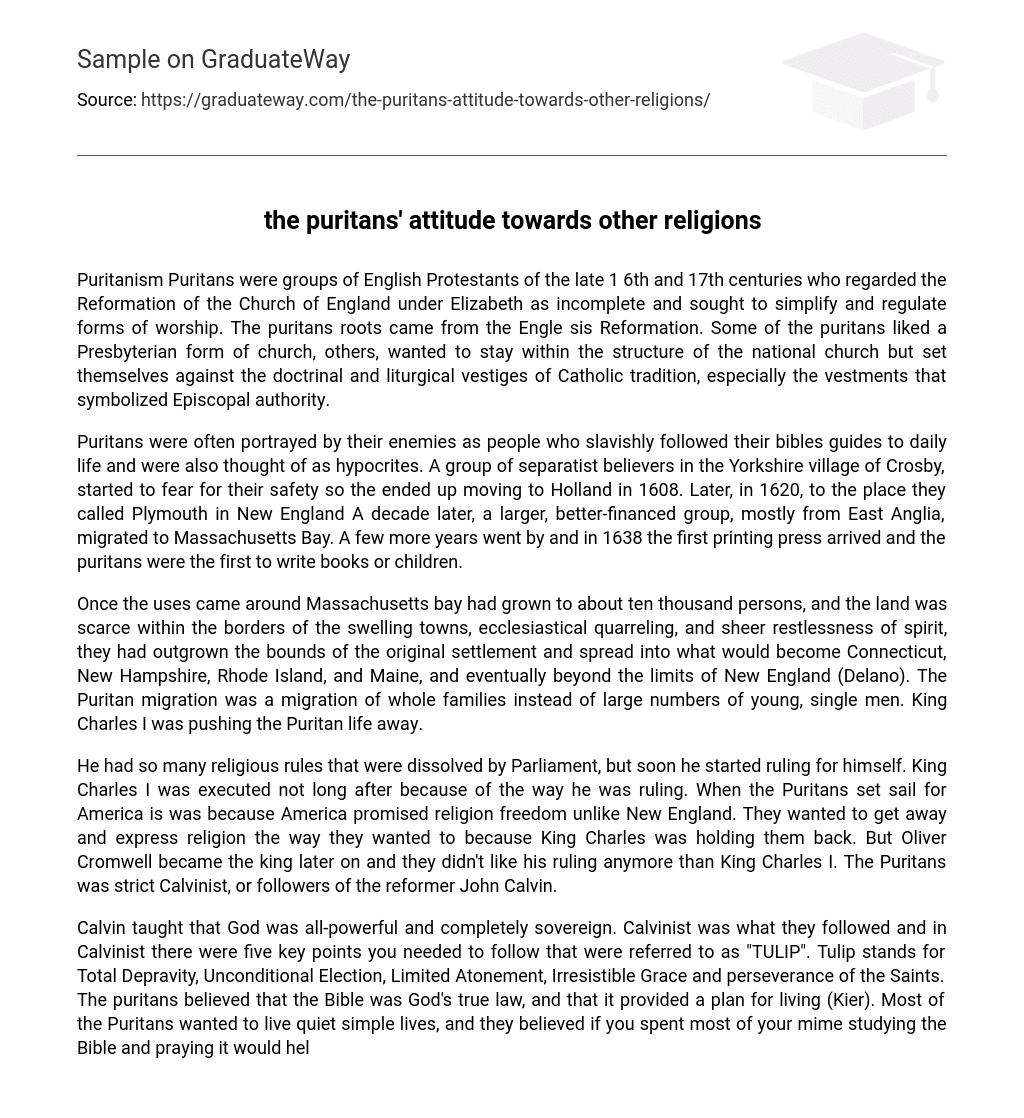Puritanism Puritans were groups of English Protestants of the late 1 6th and 17th centuries who regarded the Reformation of the Church of England under Elizabeth as incomplete and sought to simplify and regulate forms of worship. The puritans roots came from the Engle sis Reformation. Some of the puritans liked a Presbyterian form of church, others, wanted to stay within the structure of the national church but set themselves against the doctrinal and liturgical vestiges of Catholic tradition, especially the vestments that symbolized Episcopal authority.
Puritans were often portrayed by their enemies as people who slavishly followed their bibles guides to daily life and were also thought of as hypocrites. A group of separatist believers in the Yorkshire village of Crosby, started to fear for their safety so the ended up moving to Holland in 1608. Later, in 1620, to the place they called Plymouth in New England A decade later, a larger, better-financed group, mostly from East Anglia, migrated to Massachusetts Bay. A few more years went by and in 1638 the first printing press arrived and the puritans were the first to write books or children.
Once the uses came around Massachusetts bay had grown to about ten thousand persons, and the land was scarce within the borders of the swelling towns, ecclesiastical quarreling, and sheer restlessness of spirit, they had outgrown the bounds of the original settlement and spread into what would become Connecticut, New Hampshire, Rhode Island, and Maine, and eventually beyond the limits of New England (Delano). The Puritan migration was a migration of whole families instead of large numbers of young, single men. King Charles I was pushing the Puritan life away.
He had so many religious rules that were dissolved by Parliament, but soon he started ruling for himself. King Charles I was executed not long after because of the way he was ruling. When the Puritans set sail for America is was because America promised religion freedom unlike New England. They wanted to get away and express religion the way they wanted to because King Charles was holding them back. But Oliver Cromwell became the king later on and they didn’t like his ruling anymore than King Charles I. The Puritans was strict Calvinist, or followers of the reformer John Calvin.
Calvin taught that God was all-powerful and completely sovereign. Calvinist was what they followed and in Calvinist there were five key points you needed to follow that were referred to as “TULIP”. Tulip stands for Total Depravity, Unconditional Election, Limited Atonement, Irresistible Grace and perseverance of the Saints. The puritans believed that the Bible was God’s true law, and that it provided a plan for living (Kier). Most of the Puritans wanted to live quiet simple lives, and they believed if you spent most of your mime studying the Bible and praying it would help you get into heaven.
Their culture you could say was a lot similar to Great Britain’s. If you didn’t have the same beliefs as one another then you were considered an outcast in their society. The Puritans were just very serious individuals. They had one way of doing things and they didn’t want to change it for anything. They didn’t celebrate any holidays, have parties, listen to music, or anything we do now days. It was all about going to church, worshiping god, reading the bible. Being the way that the Puritans were made it really hard for them to really fit in anywhere.
The Demise of Puritanism was a result of the strict rules the Puritan society placed on every aspect of their lives, this bible ruled society began to lose many of its members, eventually leading to its failure (English). Most of the worshippers rejected their beliefs because the Puritans were very unwelcoming people and because of their inexcusTABLE ideas that life was to be lived by the bible and sin was to be punished severely along with pleasure. Because of this the Puritans found themselves out of power in the Great Ejection of 1662.
There were many things that influenced the demise of the Puritans. Their work ethic along with their international struggle they faced in America were two major ones. The work ethnic caused them to prosper, but the affluence corrupted them. But because they turned inward, focusing on family alone, and not even evangelism, they Went into decline. They also had a very “closed in” lifestyle. As for the struggle in America, there was a great al of hatred because of the power the puritans held over many.
Puritans really influenced the American culture and they have become part of American identity. Other people in different countries think of Americans as puritans, and in spite of big population in America, many of them embrace some of the puritan values such as long hours of hard work, few vacation and days off, pride in not missing work, and they pass these values onto their children (Elliot). The society the puritans built had a major effect on the history of the United States. All of their values, education, and hard work will never be forgotten.





